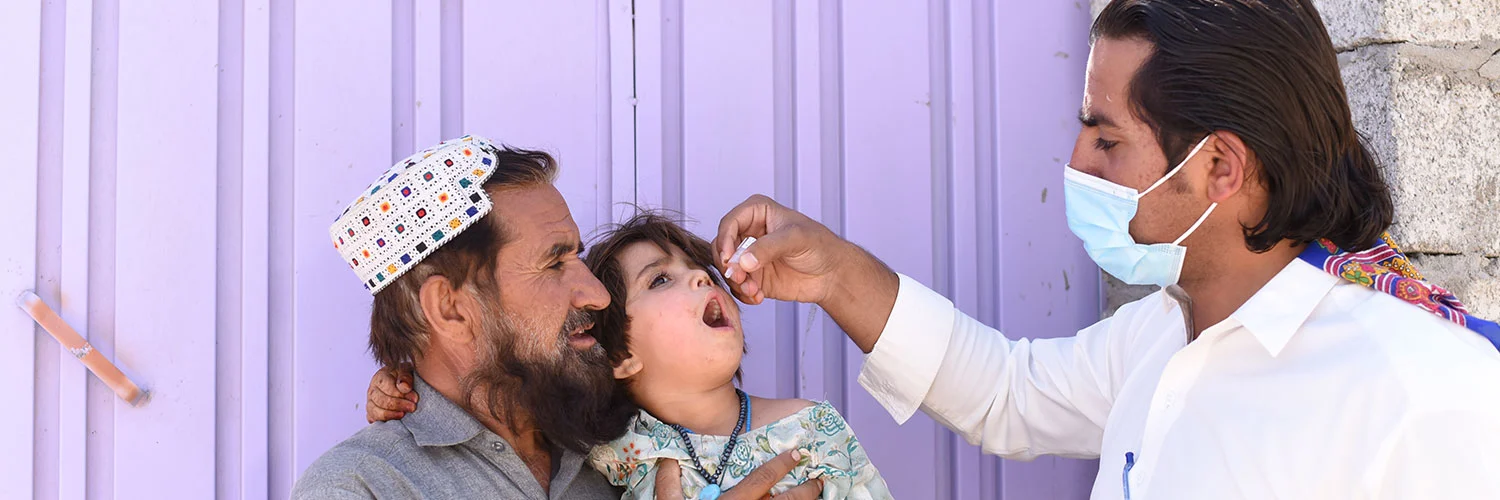Even in the toughest of times, our focus has remained on ending polio, Health minister tells international delegation
ISLAMABAD, MARCH 17, 2023 – A delegation of the French Agency for Development and the Bill and Melinda Gates Foundation met Federal Health Minister Mr. Abdul Qadir Patel to discuss avenues for cooperation in social protection and health, with a focus on polio eradication.
The delegation was visiting Pakistan to identify the country’s needs as it works towards interrupting poliovirus transmission in 2023, and to understand areas for support in light of the climate catastrophe of 2022, which left more than 33 million people in need of aid.
During the meeting on polio eradication, Minister Abdul Qadir Patel said, “Our health service infrastructure was severely damaged in many districts and thousands of people lost their homes and livelihoods, placing a severe strain on our social protection mechanisms after the 2022 floods. We are still recovering, but despite these toughest of times, Pakistan has not diluted its focus from polio eradication. We owe our children of Pakistan a polio free future, like children all over the world, deserve a life free from a preventable paralytic disease.”
The Gates Foundation delegation was led by Jay Wenger, Global Head for Polio Eradication, while the French Agency for Development delegation was headed by Agnès Soucat, Director of Health and Social Protection.
The delegation members appreciated the progress made by Pakistan last year and they expressed their wish that the end to polio was very much in sight with only seven districts remaining polio endemic. All polio cases after 2021 have been reported from southern Khyber Pakhtunkhwa.
“Thanks to the generous support of the international community, Pakistan has been aggressively fighting the poliovirus. Support from donors to close the gap on funding so we can successfully conduct immunization campaigns - the impetus needed to make it to the end of this journey. We are actively working to eliminate the virus in the last remaining geographical area and in pockets of under-immunized populations,” the minister added.
“An investment in polio is an investment in health systems,” said Special Secretary, MoNHSRC. “The polio programme has proven how it can offer the most reliable support for the most challenging of health emergencies.”
“When the pandemic hit Pakistan, within days AFP surveillance teams became COVID surveillance teams. After the COVID vaccine arrived, polio workers were on the forefront of tackling vaccine hesitancy and making citizens aware of COVID-19 vaccination sites during door-to-door campaigns,” said Dr Shahzad Baig, the Coordinator for the National Emergency Operations Centre for Polio Eradication.
Remarkable support was seen during the floods too, he added. “Thousands of polio workers were affected by the floods. But even at a time when they lost so much themselves, they were on ground helping at health camps organized by the Polio Eradication Initiative.”
The delegation said the political commitment at all levels towards polio eradication was admirable.
Note for the Editor:
Polio is a highly infectious disease caused by poliovirus mainly affecting children under the age of five years. It invades the nervous system and can cause paralysis or even death. While there is no cure for polio, vaccination is the most effective way to protect children from this crippling disease. Each time a child under the age of five is vaccinated, their protection against the virus is increased. Repeated immunizations have protected millions of children from polio, allowing almost all countries in the world to become polio-free, besides the two endemic countries of Pakistan and Afghanistan.
For further information, please contact:
Mr. Zulfiqar Babakhel, Media Manager, NEOC, 0345-9165937; Email: This email address is being protected from spambots. You need JavaScript enabled to view it.

